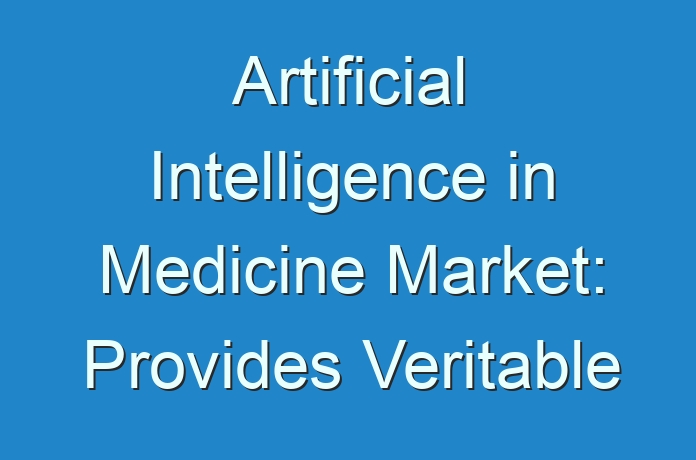
Artificial Intelligence in Medicine Market – Overview
Artificial intelligence (AI) has the potential to revolutionize any piece of work that can be operated via binary commands and has a finite set of possibilities. The concept of AI is currently being harnessed furiously, and the forever flourishing field of health care is leveraging it to attain greater goods for humanity. Now, artificial intelligence is touching almost every field of concern such as business, translation, advertising, photography, and many more. Artificial intelligence is also significantly being used in the health care sector. Currently, medical artificial intelligence has been adopting various computer aided technologies to perform clinical diagnoses and suggest treatments. AI has the capability of detecting meaningful relationships in a data set and has been widely used in many clinical situations to diagnose, treat, and predict results.
Artificial Intelligence in Medicine Market – Trends and Opportunities
Furthermore, the application of artificial intelligence (AI) techniques to medical problems has been a goal of computing since the development of high-speed digital computers. Going forward, AI is estimated to aid not only in diagnosis procedures but also in drug development, devising personalized medicine, and closely monitoring patients. A large number of pioneering technology vendors are currently involved in developing AI algorithms for the health care sector. Furthermore, the importance of computer-aided medical education is estimated to increase in the coming years. Medical educators, rather than computer scientists, are taking the lead in this selection process. Aided by careful studies, they are identifying deficiencies in the current (non-computerized) medical education process.
Artificial intelligence companies are growing at a much faster rate than expected. Technological giants in artificial intelligence such as Apple, Microsoft, Tesla, Google, etc. have predicted AI to be the technology of the future. Even these companies are surprised by the rapid growth of artificial intelligence. Furthermore, investment in AI has increased to over six times in the past few years. Organizations are investing heavily in AI companies. This has sped up the research work process in the field of AI. Companies are now able to hire more resources, and this is one of the main reasons for the growth of AI companies. Business intelligence and analytics have also improved to a great extent, which is also important for the growth of AI companies. Additionally, growing importance of precision medicine, increase in the number of cross-industry collaborations, consistent inflow of venture capital investments, and a rise in the geriatric population are some of the other factors that are expected to drive the artificial intelligence in medicine market.
For More Industry Insight, Request Brochure@ https://www.transparencymarketresearch.com/sample/sample.php?flag=B&rep_id=53157
Also, development of medical artificial intelligence has been related to the development of AI programs intended to help clinicians in the formulation of a diagnosis, the making of therapeutic decisions, and the prediction of outcomes. They are designed to support health care workers in their everyday duties, assisting with tasks that rely on the manipulation of data and knowledge. On the other hand, reluctance of medical practitioners in adopting new technologies, strong lack of a preset and universal regulatory guidelines, lack of curated health care data, and concerns of data privacy are anticipated to hinder the artificial intelligence in medicine Market in the next few years. The adoption of artificial intelligence in medicine in European countries such as the U.K., Germany, etc. is expected to offer opportunities to the artificial intelligence in medicine market in the near future.
Artificial Intelligence in Medicine Market – Segmentation
The artificial intelligence in medicine market can be segmented based on technology, application, component, and region. In terms of technology, the artificial intelligence in medicine market can be classified into querying method, deep learning, context aware processing, and natural language processing. Based on application, the artificial intelligence in medicine market can be categorized into virtual assistant, research and drug discovery, medical imaging and diagnosis, precision medicine, clinical research trial, and personalized medicine. In terms of component, the artificial intelligence in medicine market can be classified into hardware, software, and services.





